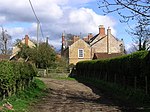Walworth, County Durham
Places in the Borough of DarlingtonPlaces in the Tees ValleyUse British English from October 2013Villages in County Durham

Walworth is a central small village with outlying farmsteads, which together constitute a scattered village in the borough of Darlington and the ceremonial county of County Durham, England. It is a civil parish which does not have a church. The population of this civil parish at the 2011 Census was 240. It is situated 2.5 miles (4.0 km) to the north-west of Darlington. The nucleus of the central village is the 16th-century Walworth Castle, which is now a hotel. On the north side of the village, around North Farm, are earthworks signifying a lost settlement, grouped around a barn which was once a chapel.
Excerpt from the Wikipedia article Walworth, County Durham (License: CC BY-SA 3.0, Authors, Images).Walworth, County Durham
Geographical coordinates (GPS) Address Nearby Places Show on map
Geographical coordinates (GPS)
| Latitude | Longitude |
|---|---|
| N 54.565 ° | E -1.639 ° |
Address
DL2 2LZ
England, United Kingdom
Open on Google Maps










